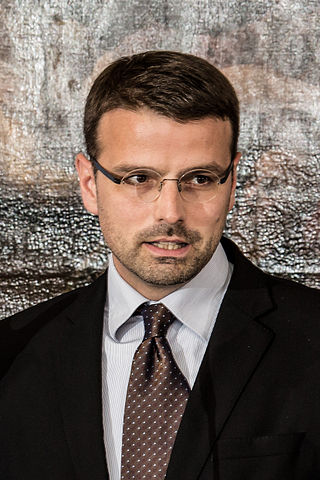Related Research Articles
A mental disorder, also referred to as a mental illness, a mental health condition, or a psychiatric disability, is a behavioral or mental pattern that causes significant distress or impairment of personal functioning. A mental disorder is also characterized by a clinically significant disturbance in an individual's cognition, emotional regulation, or behavior, often in a social context. Such disturbances may occur as single episodes, may be persistent, or may be relapsing–remitting. There are many different types of mental disorders, with signs and symptoms that vary widely between specific disorders. A mental disorder is one aspect of mental health.
Historically, mental disorders have had three major explanations, namely, the supernatural, biological and psychological models. For much of recorded history, deviant behavior has been considered supernatural and a reflection of the battle between good and evil. When confronted with unexplainable, irrational behavior and by suffering and upheaval, people have perceived evil. In fact, in the Persian Empire from 550 to 330 B.C.E., all physical and mental disorders were considered the work of the devil. Physical causes of mental disorders have been sought in history. Hippocrates was important in this tradition as he identified syphilis as a disease and was, therefore, an early proponent of the idea that psychological disorders are biologically caused. This was a precursor to modern psycho-social treatment approaches to the causation of psychopathology, with the focus on psychological, social and cultural factors. Well known philosophers like Plato, Aristotle, etc., wrote about the importance of fantasies, dreams, and thus anticipated, to some extent, the fields of psychoanalytic thought and cognitive science that were later developed. They were also some of the first to advocate for humane and responsible care for individuals with psychological disturbances.

Depression is a mental state of low mood and aversion to activity. It affects about 3.5% of the global population, or about 280 million people worldwide, as of 2020. Depression affects a person's thoughts, behavior, feelings, and sense of well-being. The pleasure or joy that a person gets from certain experiences is reduced, and the afflicted person often experiences a loss of motivation or interest in those activities. People with depression may experience sadness, feelings of dejection or hopelessness, difficulty in thinking and concentration, or a significant change in appetite or time spent sleeping; suicidal thoughts can also be experienced.
Biological psychiatry or biopsychiatry is an approach to psychiatry that aims to understand mental disorder in terms of the biological function of the nervous system. It is interdisciplinary in its approach and draws on sciences such as neuroscience, psychopharmacology, biochemistry, genetics, epigenetics and physiology to investigate the biological bases of behavior and psychopathology. Biopsychiatry is the branch of medicine which deals with the study of the biological function of the nervous system in mental disorders.

Grandiose delusions (GDs), also known as delusions of grandeur or expansive delusions, are a subtype of delusion characterized by the extraordinary belief that one is famous, omnipotent, wealthy, or otherwise very powerful or of a high status. Grandiose delusions often have a religious, science fictional, or supernatural theme. Examples include the extraordinary belief that one is a deity or celebrity, or that one possesses fantastical talents, accomplishments, or superpowers.

Islamic psychology or ʿilm al-nafs, the science of the nafs, is the medical and philosophical study of the psyche from an Islamic perspective and addresses topics in psychology, neuroscience, philosophy of mind, and psychiatry as well as psychosomatic medicine. In Islam, mental health and mental illness were viewed with a holistic approach. This approach emphasized the mutual connection between maintaining adequate mental wellbeing and good physical health in an individual. People who practice Islam thought it was necessary to maintain positive mental health in order to partake in prayer and other religious obligations.

Psychiatry is the medical specialty devoted to the diagnosis, prevention, and treatment of deleterious mental conditions. These include various matters related to mood, behaviour, cognition, perceptions, and emotions.
What was previously known as melancholia and is now known as clinical depression, major depression, or simply depression and commonly referred to as major depressive disorder by many health care professionals, has a long history, with similar conditions being described at least as far back as classical times.
Spiritual crisis is a form of identity crisis where an individual experiences drastic changes to their meaning system typically because of a spontaneous spiritual experience. A spiritual crisis may cause significant disruption in psychological, social, and occupational functioning. Among the spiritual experiences thought to lead to episodes of spiritual crisis or spiritual emergency are psychiatric complications related to existential crisis, mystical experience, near-death experiences, Kundalini syndrome, paranormal experiences, religious ecstasy, or other spiritual practices.
Handbook of Religion and Health is a scholarly book about the relation of spirituality and religion with physical and mental health. Written by Harold G. Koenig, Michael E. McCullough, and David B. Larson, the first edition was published in the United States in 2001. Subsequent editions in 2012 and 2023 provide entirely new content as each edition reviews researched published since the previous edition. The book has been discussed in magazines and reviewed in professional journals.

Multidimensional Measurement of Religiousness/Spirituality for Use in Health Research is a report, originally published in 1999, by a Fetzer Institute / National Institute on Aging working group on the measurement of religion and spirituality. A revised version with a new preface was published in 2003. The book presents a series of 12 self-report questionnaire measures, each focused on a particular aspect of religiousness or spirituality, along with reviews of underlying theory and supporting research. The book's purpose is to provide validated measures of spiritual and religious factors in health research. The book includes the Brief Multidimensional Measure of Religiousness/Spirituality (BMMRS), a practical measure with selected items from the 12 previous chapters.

Depression, one of the most commonly diagnosed psychiatric disorders, is being diagnosed in increasing numbers in various segments of the population worldwide. Depression in the United States alone affects 17.6 million Americans each year or 1 in 6 people. Depressed patients are at increased risk of type 2 diabetes, cardiovascular disease and suicide. Within the next twenty years depression is expected to become the second leading cause of disability worldwide and the leading cause in high-income nations, including the United States. In approximately 75% of suicides, the individuals had seen a physician within the prior year before their death, 45–66% within the prior month. About a third of those who died by suicide had contact with mental health services in the prior year, a fifth within the preceding month.

Raphael M. Bonelli is an Austrian neuroscientist and psychiatrist.

Faith and Health: Psychological Perspectives is a book of scientific psychology on the relationship between religious faith and health. Edited by Thomas G. Plante and Allen C. Sherman, the book was published in the United States in 2001.
Scholarly studies have investigated the effects of religion on health. The World Health Organization (WHO) discerns four dimensions of health, namely physical, social, mental, and spiritual health. Having a religious belief may have both positive and negative impacts on health and morbidity.
A religious delusion is defined as a delusion, or fixed belief not amenable to change in light of conflicting evidence, involving religious themes or subject matter. Religious faith, meanwhile, is defined as a belief in a religious doctrine or higher power in the absence of evidence. Psychologists, scientists, and philosophers have debated the distinction between the two, which is subjective and cultural.
One of the most common ways that people cope with trauma is through the comfort found in religious or spiritual practices. Psychologists of religion have performed multiple studies to measure the positive and negative effects of this coping style. Leading researchers have split religious coping into two categories: positive religious coping and negative religious coping. Individuals who use positive religious coping are likely to seek spiritual support and look for meaning in a traumatic situation. Negative religious coping expresses conflict, question, and doubt regarding issues of God and faith.
The relationship between religion and schizophrenia is of particular interest to psychiatrists because of the similarities between religious experiences and psychotic episodes. Religious experiences often involve reports of auditory and/or visual phenomena, which sounds seemingly similar to those with schizophrenia who also commonly report hallucinations and delusions. These symptoms may resemble the events found within a religious experience. However, the people who report these religious visual and audio hallucinations also claim to have not perceived them with their five senses, rather, they conclude these hallucinations were an entirely internal process.
Self-transcendence is a personality trait that involves the expansion or evaporation of personal boundaries. This may potentially include spiritual experiences such as considering oneself an integral part of the universe. Several psychologists, including Viktor Frankl, Abraham Maslow, and Pamela G. Reed have made contributions to the theory of self-transcendence.
David H. Rosmarin is an American psychologist who specializes in anxiety. He is an associate professor at Harvard Medical School and the founder of Center for Anxiety, which he directs. Rosmarin is also an author, and has worked as McLean Hospital's director of spirituality and mental health.
References
- ↑ Sloan, Richard P. (2006). Blind faith : the unholy alliance of religion and medicine . Internet Archive. New York : St. Martin's Press. pp. 60–63. ISBN 9780312348816.
- 1 2 3 4 Curriculum Vitae: Harold G. Koenig Archived 22 November 2017 at the Wayback Machine , accessed 1 February 2010.
- ↑ Bonelli, RM; Koenig, H (2013). "Mental Disorders, Religion and Spirituality 1990 to 2010: A Systematic Evidence-Based Review". Journal of Religion and Health. 52 (2): 657–73. doi:10.1007/s10943-013-9691-4. PMID 23420279. S2CID 25776972.
- ↑ Claudia Kalb (10 November 2003). "Can Religion Improve Health? While The Debate Rages In Journals And Med Schools, More Americans Ask For Doctors' Prayers ." Newsweek .